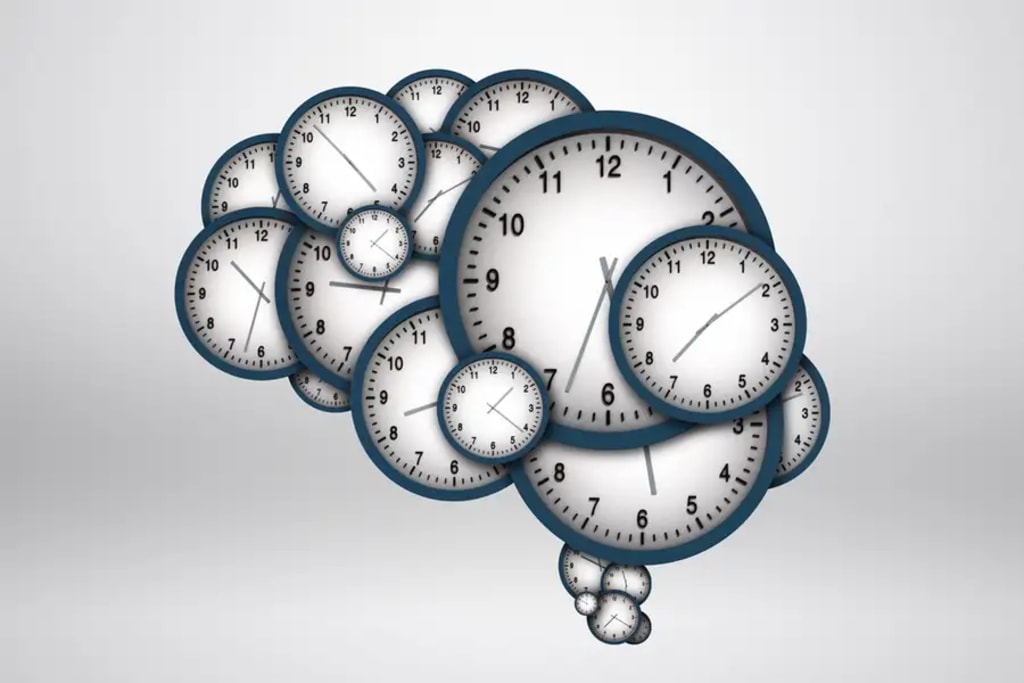The Illusion of Time: How Our Minds Shape the Past and Present
Feeling Time: Navigating the Paradox of Perception

Introduction:
Time, an abstract concept that governs our existence, is far from a straightforward linear progression. Instead, it is a mysterious dimension, intricately interwoven with our memories and experiences. Throughout our lives, we encounter temporal illusions that challenge our perception of reality, making us question the very nature of time itself. In this exploration, we delve into the fascinating world of these illusions, seeking to understand how they influence our understanding of the past and the present.
Feeling Time: The Paradox of Perception
Our relationship with time extends beyond the present moment; it encompasses our ability to feel it retrospectively. The holiday paradox exemplifies this phenomenon, where a seemingly endless airport delay can morph into a fleeting memory once the holiday begins. The duration of an activity is not solely dictated by a ticking clock but rather by the richness and significance it holds in our lives. Empty moments, devoid of stimulation and novelty, appear to drag on, while fulfilling experiences filled with emotions and excitement seem to fly by unnoticed.
Consider the mundane minutes spent waiting in line, where each second feels like an eternity. In contrast, an exhilarating day spent with friends may pass in the blink of an eye, leaving us craving for more. These contrasting perceptions reveal how our minds create the illusion of time's elasticity, shaped by the depth of our engagement with the present moment.
The Proportion Theory: Time's Speedometer
As we age, many of us experience the sensation that time accelerates, leaving us bewildered by how swiftly the years pass. The proportion theory attempts to explain this phenomenon by highlighting the relationship between the new unit of time and the entire duration of our lives. A year in our early childhood constitutes a significant portion of our existence, making it feel expansive and seemingly endless. However, as we grow older, each new year becomes a smaller fraction of our accumulated life, thus giving the illusion of time speeding up.
While studies have found that weeks and months are not significantly affected by this perception, decades play a pivotal role. Beyond the age of 50, the speed of time's passage appears to stabilize, suggesting that our memory formation and the events that shape our lives contribute to our temporal perception.
Embracing Forgettable Moments
Life is an amalgamation of memorable and forgettable moments. We often dwell on the unforgettable experiences that shape our lives, but we must not dismiss the significance of the unremarkable days. As we age, novelty diminishes, leading to fewer unique memories. Consequently, we subconsciously associate shorter durations with recent decades, as they offer fewer distinct recollections.
Imagine looking back at the past ten years; the memories that stand out are likely the ones filled with joy, sorrow, or transformation. However, the seemingly mundane days, though forgotten, still contributed to the fabric of our existence. Embracing the forgettable moments grants us a deeper appreciation for the entirety of our journey through time.
The Power of Recording: Capturing Time's Essence
One of the most profound ways we connect with the past is through recordings—images, videos, and historical records. These mediums possess the remarkable ability to bridge temporal gaps, making individuals from long ago seem more real than ever. Through these glimpses into history, we can revisit moments that might otherwise have been lost to the sands of time.
The impact of these recordings extends beyond preserving memories; they evoke emotions, empathy, and a sense of continuity across generations. As we immerse ourselves in historical footage, we become intertwined with the lives of those who preceded us, forging a timeless connection that transcends the boundaries of space and time.
Temporal Illusions: The Edges of Space-Time
Temporal illusions are not mere cognitive errors but rather glimpses into a dimension shaped by our minds. While physics may not define this dimension, it profoundly influences our perception of reality. As we unravel these illusions, we gain a deeper understanding of memory's intricate workings, the complexities of human experience, and the vast expanse of our minds.
Conclusion:
In the symphony of life, time weaves a complex melody, a tapestry of experiences and memories that shape our understanding of the past and the present. The illusions of time challenge our sense of reality, leading us to question the nature of this ephemeral dimension. As we navigate through the illusions of time, let us embrace the richness of each moment, cherish the unforgettable and forgettable alike, and discover solace in the knowledge that our memories and experiences shape the ever-changing landscape of our perception of time. Together, let us celebrate the enigma of time, for it is the canvas upon which we paint the masterpiece of our lives.
About the Creator
Rohit Singh
Software developer, part-time content creator, and tech enthusiast.
Unleashing creativity and embracing tech. Join me on this thrilling journey! 🚀






Comments
There are no comments for this story
Be the first to respond and start the conversation.